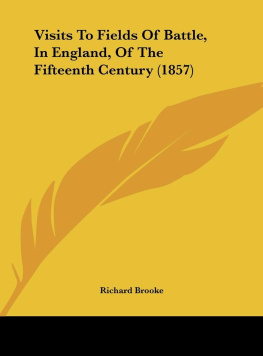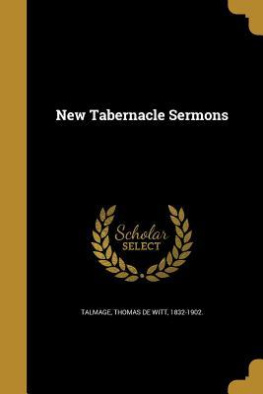PREFACE.
In the course of the fifteenth century, England experienced, in a lamentable degree, the sad effects of internal discord, and the miseries caused by the conflicts of adverse factions.
It is scarcely possible, for historians to point out, in the annals of any country in Europe, in the feudal ages, deeds of violence and bloodshed, of a more appalling nature, than those which the chroniclers have recorded, as having occurred in England, during the period which intervened between the years 1400 and 1500a period memorable for the sanguinary wars of York and Lancaster. During the continuance of those disastrous conflicts, thousands of brave men perished in arms, the axe of the executioner was seldom idle, great numbers of the nobility and gentry lost their lives in the field or upon the scaffold, property was usurped in consequence of wholesale confiscations, numberless innocent lives were sacrificed, and many happy homes were outraged.
This misery was the result of contests for a crown, which perhaps neither of the claimants merited, nor does it appear, that it was of great importance to the nation, which of the rival competitors wore it.
Of those destructive wars, the battle of Shrewsbury in the reign of Henry IV., in 1403, may be considered in some degree as the first; because it was the earliest attempt by an appeal to arms, to remove from the throne a monarch of the House of Lancaster; and the last was the battle of Stoke, fought in 1487, in the reign of Henry VII.; that of Bosworth, in which, by the death of Richard III., the Plantagenet dynasty terminated, being often erroneously called the last; but, although the latter certainly placed the House of Tudor upon the throne, the crown was secured to it by the battle of Stoke, when the partisans of the House of York, under John de la Pole, Earl of Lincoln, made their final but unsuccessful appeal to arms, in hopes of regaining the ascendency, which that party had formerly enjoyed.
These sanguinary conflicts are usually called the Wars of the Roses, from the circumstance, that the supporters of the House of York assumed the badge or device of the White Rose, and those of Lancaster the Red Rose.
It has been remarked with great truth, by Sir John Fenn, the antiquary, in adverting to that disastrous period, That our own kingdom has fewer authentic records of the transactions, during the reigns of Henry VI., Edward IV., and Richard III., than of any other later period of our history, is a truth known to and lamented by every man of historical knowledge.
He ascribes the deficiency of information, amongst other causes, to the invention of printing; which at first sight appears to be a paradox, because such an invention seems to be calculated to favour universal knowledge:At the beginning of the art of printing, those who practised it, were solicitous to perpetuate things already committed to writing, relative to past times, and past occurrences, not regarding recent transactions as of equal consequence. This art likewise probably prevented the writers of manuscripts from multiplying their copies; they foreseeing that the new invention would in time, supply a sufficient number, at a much less price, by which means, the value of their manual labour would be greatly diminished.
Notwithstanding, however, the scanty nature of the historical accounts handed down to us, some information of value has reached us; and the fields of battle, and the positions of the hostile armies, may in several instances, be clearly identified, after a perusal of the statements of the old chroniclers, and a comparison of their descriptions with the present aspect of the localities where the battles were fought.
Having felt a considerable degree of interest in the occurrences of those stirring and extraordinary times, I have repeatedly visited the scenes of action; and, by carefully comparing the statements of the old writers, the actual appearance of the fields, and the traditions of the neighbourhood, I have obtained strong confirmation, in several instances, of the accuracy of the accounts which have been handed down to us; and have derived great pleasure from visiting and exploring the various localities, and obtaining information from persons in the vicinity.
The results of my visits were committed to writing, in a series of papers, of which copies, or the principal parts, will be found in the following pages. Some historical matters will also be introduced, in such instances as tend to elucidate any important event, which immediately preceded or had a direct relation to any of the battles.
It is much to be regretted, that in the majority of historical works, describing the events of this country in the fifteenth century, whenever the exploits of any noblemen or warriors, or the talents or skill of any men of eminence, are mentioned, the authors, from some cause or other, very rarely give any information of much value relative to the individuals whose actions they are describing; but as few readers can reflect upon the surprising events of that period without feeling a considerable degree of interest in the warlike and distinguished personages, who were the principal actors in those stirring and eventful times, there will be found in the notes to this work, some explanatory and biographical particulars of the princes, nobles, and eminent persons, whose actions and conduct are noticed in it.
In the following publication will also be found some other papers and tracts, principally of an archological nature, written at various times, as the subjects came under my notice; and as they may possibly interest, in some degree, the class of readers who take pleasure in pursuits of that description, I have been induced to add them to the present collection.
In committing this work to the press, it will be a source of gratification to the Author, if his humble exertions shall be, in some degree, instrumental in elucidating any events hitherto imperfectly known, in solving any difficulties which may have suggested themselves, or in confirming the statements of the old historical writers of this country.
RICHARD BROOKE.
12thMarch, 1857.



